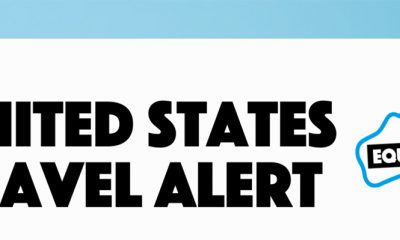Health
Local LGBT groups assist with Obamacare
Whitman-Walker, Us Helping Us, D.C. Center helping uninsured sign up
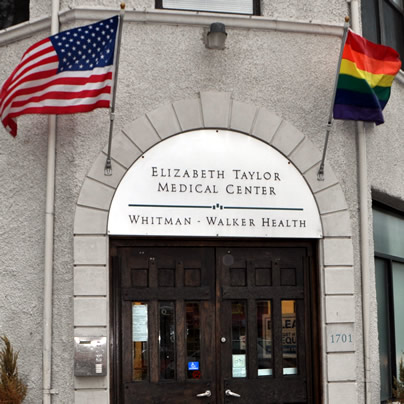
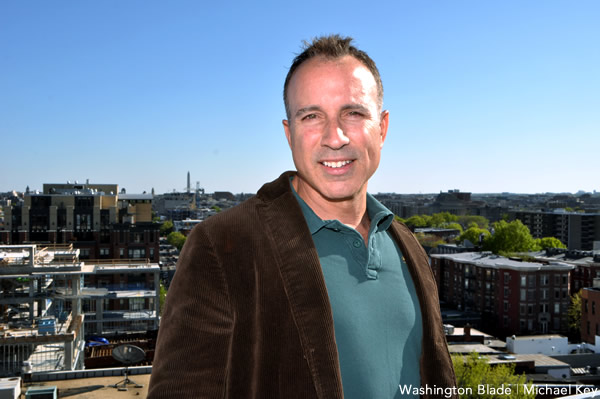
Local businessman David Franco was among several D.C.-area advocates who spoke at a news conference at the National Press Club on Tuesday to draw attention to what they consider the strong advantages of the Obamacare program. (Washington Blade file photo by Michael Key)
At least seven D.C.-based LGBT or LGBT-friendly organizations sprang into action on Tuesday to help members of the LGBT community and people with HIV choose a health insurance plan under the controversial U.S. Affordable Care Act that’s better known as “Obamacare.”
Similar to reports surfacing from across the country, officials from the local groups said some of their clients encountered computer glitches on the website for D.C. Health Link, the city’s online health insurance marketplace or “exchange” on its first day of operations on Tuesday.
But all of the officials contacted by the Blade said they were optimistic that the exchange program in D.C. and those in neighboring Maryland and Virginia would soon be operating smoothly and would be an important resource for LGBT people looking for health insurance.
“I’m excited about it,” said Ron Simmons, executive director of the D.C.-based Us Helping Us, an HIV services organization that reaches out to black gay men.
“We have so many clients who don’t have health insurance,” Simmons said. “If you are HIV positive you need a certain type of insurance, and we are ready to help people choose the best policy suited for their needs.”
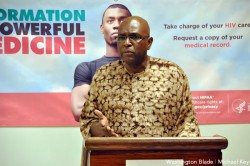
Ron Simmons, president/CEO of Us Helping Us (Washington Blade photo by Michael Key)
Us Helping Us is one of five D.C.-based organizations that received a grant from the D.C. Health Benefit Exchange Authority to recruit members of the LGBT community to sign up for insurance under the Obamacare program. The grant calls on the five groups — as well as another 30 organizations that received grants to work with other constituencies — to help their clients navigate the complicated process of choosing the best possible insurance plan.
The other organizations that received grants to work with the LGBT community on the Obamacare program are Whitman-Walker Health, D.C. Care Consortium, Damien Ministries and Health HIV.
Health HIV, a new national AIDS advocacy organization located in the Dupont Circle area, applied for its grant in partnership with the D.C. Center for the LGBT Community and Westminster Presbyterian Church’s START program. The START program provides HIV/AIDS-related services with a special outreach to people with substance abuse problems.
“This is an important opportunity to engage our communities in a conversation about healthcare and for us all to better understand the changes that are taking place in the healthcare system,” said David Mariner, executive director of the D.C. Center.
“Our goal is to help 300 individuals enroll in a healthcare plan and to make the process as simple as possible for them,” Mariner said.
Simmons of Us Helping Us said his group has a goal of helping to enroll 1,000 people on a health insurance plan through the D.C. Health Link system during the nine-month-long grant period.
“We will have town hall meetings,” said Simmons. “We will go to the clubs. Our purpose is to help people enroll in the plan best for them.”
Under the Affordable Care Act’s various provisions, Tuesday, Oct. 1, became the first day that the health insurance exchanges opened for business, enabling people to review dozens of options for insurance plans. Consumers may sign up for a plan between now and next March during the program’s first annual open enrollment period. Insurance policies won’t go into effect until Jan. 1.
In order to receive a policy that begins Jan. 1, people must sign up and pay their first monthly premium by Dec. 15, government officials in charge of the program said. People may still sign up between Dec. 15 and March 31, with their policy taking effect at the first day of the following month. After the March 31 deadline, enrollment in the program will be closed until October 2014.
Experts monitoring the system have said the cost of premiums and additional payments such as deductibles and co-payments for doctor visits and prescription drugs vary widely with the different options available. But those familiar with the program say the costs so far appear to be significantly lower than health insurance available in the past in the private market.
Carl Schmid, deputy director of the AIDS Institute, a national AIDS advocacy organization, noted that low-income people may now enroll in Medicaid in the states that have agreed to expand their Medicaid programs under a non-mandatory provision of the Affordable Care Act. D.C. and Maryland opted to become part of the expanded Medicaid program while Virginia declined to do so.
Schmid points out that prior to the Affordable Care Act’s Medicaid provision, which took effect last year, low-income people with HIV who didn’t have private health insurance were not eligible for Medicaid unless they were medically disabled with an AIDS diagnosis.
“So now people with HIV who don’t have full-blown AIDS qualify for Medicaid,” Schmid said. “Our goal, of course, is to keep these people healthy.”
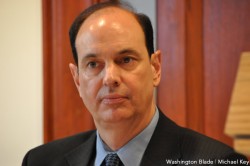
AIDS Institute Deputy Executive Director Carl Schmid (Washington Blade file photo by Michael Key)
Schmid and others familiar with the Obamacare program note that in Virginia and other states that chose not to participate in the expanded Medicaid program, people with incomes below a certain federally defined level are eligible for federal subsidies to help pay for their insurance premiums and co-pays.
Erin Loubier, director of public benefits and senior managing attorney for Whitman-Walker Health, said people with HIV and LGBT people whose income levels may not make them eligible for the subsidies will benefit from another provision of the healthcare law already in effect.
“Anyone living with HIV or another chronic health condition will be able to get insurance,” she said, noting that prior to the Obamacare law insurance companies routinely rejected people with a pre-existing condition.
She said the generally lower prices for premiums through the exchanges will also benefit those who aren’t eligible for subsidies.
Under its grant from the D.C. Health Benefit Exchange Authority, Whitman-Walker will provide its clients as well as non-clients the services of trained “navigators” or “assisters” to help people choose the best insurance policy through D.C. Health Link. According to Loubier, Whitman-Walker will also provide training for people to become navigators and, similar to Us Helping Us, will reach out into the community to recruit people to sign up for insurance under the Obamacare program.
“The role of these assisters is critical,” she said. “Even computer savvy people may not be able to navigate the system by themselves.”
Guy Westin, executive director of D.C. Care Consortium, which provides services to people with HIV, said his group is providing navigator services to individuals as well as non-profit community organizations about the enrollment process for Obamacare.
D.C. gay businessman David Franco, owner of the clothing store chain Universal Gear and the real estate development company Level Two, said he was pleased to discover that prices announced so far by insurance companies offering employer health plans for small businesses are lower than previously available plans.
“I was able to see in a matter of 15 minutes with a couple of clicks on my keyboard what my rate would be and compare that to an equivalent plan and see the savings that are offered by different insurance companies,” Franco said.
“So the fact that you’ve got this open, free market has really created this price competition, and it’s going to drop the overall cost for the plan for all of my employees,” he said.
Franco was among several D.C.-area advocates who spoke at a news conference at the National Press Club on Tuesday called by D.C. Health Link and the healthcare consumers’ group Families USA to draw attention to what they consider the strong advantages of the Obamacare program.
Similar to Americans across the country, local LGBT advocates working on the Obamacare program say some LGBT people will likely be surprised and put off when they realize they will be subjected to a $95 tax penalty from the IRS in 2014 if they don’t have insurance and fail to buy a policy under the new program. The penalty for not having insurance in 2015 goes up to $700.
Federal officials in charge of Obamacare point out that people who already have insurance either through their employer or on the private market and people already on Medicaid or Medicare will not be required to do anything under the new program. Their insurance status will remain as it is, officials said.
Following is a list of the seven D.C.- based organizations known to be providing services to the help the LGBT community and people with HIV access the Obamacare program, including the process of singing up for an insurance plan. Officials with the groups say it’s preferable to call first for an appointment but walk-ins are accommodated when possible.
Whitman-Walker Health
1701 14th St., N.W.
Us Helping Us
3636 Georgia Ave., N.W.
D.C. Care Consortium
7059 Blaire Road, N.W., Suite
Health HIV
2000 S St., N.W.
Damien Ministries
2200 Rhode Island Ave., N.E.
D.C. Center for the LGBT Community
1318 U St., N.W.
START Program at Westminster Presbyterian Church
400 I St., S.W.
Monkeypox
US contributes more than $90 million to fight mpox outbreak in Africa
WHO and Africa CDC has declared a public health emergency

The U.S. has contributed more than $90 million to the fight against the mpox outbreak in Africa.
The U.S. Agency for International Development on Tuesday in a press release announced “up to an additional” $35 million “in emergency health assistance to bolster response efforts for the clade I mpox outbreak in Central and Eastern Africa, pending congressional notification.” The press release notes the Biden-Harris administration previously pledged more than $55 million to fight the outbreak in Congo and other African countries.
“The additional assistance announced today will enable USAID to continue working closely with affected countries, as well as regional and global health partners, to expand support and reduce the impact of this outbreak as it continues to evolve,” it reads. “USAID support includes assistance with surveillance, diagnostics, risk communication and community engagement, infection prevention and control, case management, and vaccination planning and coordination.”
The World Health Organization and the Africa Centers for Disease Control and Prevention last week declared the outbreak a public health emergency.
The Washington Blade last week reported there are more than 17,000 suspected mpox cases across in Congo, Uganda, Kenya, Rwanda, and other African countries. The outbreak has claimed more than 500 lives, mostly in Congo.
Health
Mpox outbreak in Africa declared global health emergency
ONE: 10 million vaccine doses needed on the continent

Medical facilities that provide treatment to gay and bisexual men in some East African countries are already collaborating with them to prevent the spread of a new wave of mpox cases after the World Health Organization on Wednesday declared a global health emergency.
The collaboration, both in Uganda and Kenya, comes amid WHO’s latest report released on Aug. 12, which reveals that nine out of every 10 reported mpox cases are men with sex as the most common cause of infection.
The global mpox outbreak report — based on data that national authorities collected between January 2022 and June of this year — notes 87,189 of the 90,410 reported cases were men. Ninety-six percent of whom were infected through sex.
Sexual contact as the leading mode of transmission accounted for 19,102 of 22,802 cases, followed by non-sexual person-to-person contact. Genital rash was the most common symptom, followed by fever and systemic rash.
The WHO report states the pattern of mpox virus transmission has persisted over the last six months, with 97 percent of new cases reporting sexual contact through oral, vaginal, or anal sex with infected people.
“Sexual transmission has been recorded in the Democratic Republic of Congo among sex workers and men who have sex with men,” the report reads. “Among cases exposed through sexual contact in the Democratic Republic of the Congo, some individuals present only with genital lesions, rather than the more typical extensive rash associated with the virus.”
The growing mpox cases, which are now more than 2,800 reported cases in at least 13 African countries that include Kenya, Uganda, Rwanda, and prompted the Africa Centers for Disease Control and Prevention this week to declare the disease a public health emergency for resource mobilization on the continent to tackle it.
“Africa has long been on the frontlines in the fight against infectious diseases, often with limited resources,” said Africa CDC Director General Jean Kaseya. “The battle against Mpox demands a global response. We need your support, expertise, and solidarity. The world cannot afford to turn a blind eye to this crisis.”
The disease has so far claimed more than 500 lives, mostly in Congo, even as the Africa CDC notes suspected mpox cases across the continent have surged past 17,000, compared to 7,146 cases in 2022 and 14,957 cases last year.
“This is just the tip of the iceberg when we consider the many weaknesses in surveillance, laboratory testing, and contact tracing,” Kaseya said.
WHO, led by Director General Tedros Adhanom Ghebreyesus, also followed the Africa CDC’s move by declaring the mpox outbreak a public health emergency of international concern.
The latest WHO report reveals that men, including those who identify as gay and bisexual, constitute most mpox cases in Kenya and Uganda. The two countries have recorded their first cases, and has put queer rights organizations and health care centers that treat the LGBTQ community on high alert.
The Uganda Minority Shelters Consortium, for example, confirmed to the Washington Blade that the collaboration with health service providers to prevent the spread of mpox among gay and bisexual men is “nascent and uneven.”
“While some community-led health service providers such as Ark Wellness Clinic, Children of the Sun Clinic, Ice Breakers Uganda Clinic, and Happy Family Youth Clinic, have demonstrated commendable efforts, widespread collaboration on mpox prevention remains a significant gap,” UMSC Coordinator John Grace stated. “This is particularly evident when compared to the response to the previous Red Eyes outbreak within the LGBT community.”
Grace noted that as of Wednesday, there were no known queer-friendly health service providers to offer mpox vaccinations to men who have sex with men. He called for health care centers to provide inclusive services and a more coordinated approach.
Although Grace pointed out the fear of discrimination — and particularly Uganda’s Anti-Homosexuality Act — remains a big barrier to mpox prevention through testing, vaccination, and treatment among queer people, he confirmed no mpox cases have been reported among the LGBTQ community.
Uganda so far has reported two mpox cases — refugees who had travelled from Congo.
“We are for the most part encouraging safer sex practices even after potential future vaccinations are conducted as it can also be spread through bodily fluids like saliva and sweat,” Grace said.
Grace also noted that raising awareness about mpox among the queer community and seeking treatment when infected remains a challenge due to the historical and ongoing homophobic stigma and that more comprehensive and reliable advocacy is needed. He said Grindr and other digital platforms have been crucial in raising awareness.
The declarations of mpox as a global health emergency have already attracted demand for global leaders to support African countries to swiftly obtain the necessary vaccines and diagnostics.
“History shows we must act quickly and decisively when a public health emergency strikes. The current Mpox outbreak in Africa is one such emergency,” said ONE Global Health Senior Policy Director Jenny Ottenhoff.
ONE is a global, nonpartisan organization that advocates for the investments needed to create economic opportunities and healthier lives in Africa.
Ottenhoff warned failure to support the African countries with medical supplies needed to tackle mpox would leave the continent defenseless against the virus.
To ensure that African countries are adequately supported, ONE wants governments and pharmaceutical companies to urgently increase the provision of mpox vaccines so that the most affected African countries have affordable access to them. It also notes 10 million vaccine doses are currently needed to control the mpox outbreak in Africa, yet the continent has only 200,000 doses.
The Blade has reached out to Ishtar MSM, a community-based healthcare center in Nairobi, Kenya, that offers to service to gay and bisexual men, about their response to the mpox outbreak.
Health
White House urged to expand PrEP coverage for injectable form
HIV/AIDS service organizations made call on Wednesday

A coalition of 63 organizations dedicated to ending HIV called on the Biden-Harris administration on Wednesday to require insurers to cover long-acting pre-exposure prophylaxis (PrEP) without cost-sharing.
In a letter to Chiquita Brooks-LaSure, administrator of the Centers for Medicare and Medicaid Services, the groups emphasized the need for broad and equitable access to PrEP free of insurance barriers.
Long-acting PrEP is an injectable form of PrEP that’s effective over a long period of time. The FDA approved Apretude (cabotegravir extended-release injectable suspension) as the first and only long-acting injectable PrEP in late 2021. It’s intended for adults and adolescents weighing at least 77 lbs. who are at risk for HIV through sex.
The U.S. Preventive Services Task Force updated its recommendation for PrEP on Aug. 22, 2023, to include new medications such as the first long-acting PrEP drug. The coalition wants CMS to issue guidance requiring insurers to cover all forms of PrEP, including current and future FDA-approved drugs.
“Long-acting PrEP can be the answer to low PrEP uptake, particularly in communities not using PrEP today,” said Carl Schmid, executive director of the HIV+Hepatitis Policy Institute. “The Biden administration has an opportunity to ensure that people with private insurance can access PrEP now and into the future, free of any cost-sharing, with properly worded guidance to insurers.”
Currently, only 36 percent of those who could benefit from PrEP are using it. Significant disparities exist among racial and ethnic groups. Black people constitute 39 percent of new HIV diagnoses but only 14 percent of PrEP users, while Latinos represent 31 percent of new diagnoses but only 18 percent of PrEP users. In contrast, white people represent 24 percent of HIV diagnoses but 64 percent of PrEP users.
The groups also want CMS to prohibit insurers from employing prior authorization for PrEP, citing it as a significant barrier to access. Several states, including New York and California, already prohibit prior authorization for PrEP.
Modeling conducted for HIV+Hep, based on clinical trials of a once every 2-month injection, suggests that 87 percent more HIV cases would be averted compared to daily oral PrEP, with $4.25 billion in averted healthcare costs over 10 years.
Despite guidance issued to insurers in July 2021, PrEP users continue to report being charged cost-sharing for both the drug and ancillary services. A recent review of claims data found that 36 percent of PrEP users were charged for their drugs, and even 31 percent of those using generic PrEP faced cost-sharing.
The coalition’s letter follows a more detailed communication sent by HIV+Hepatitis Policy Institute to the Biden administration on July 2.
Signatories to the community letter include Advocates for Youth, AIDS United, Equality California, Fenway Health, Human Rights Campaign, and the National Coalition of STD Directors, among others.
-

 U.S. Federal Courts4 days ago
U.S. Federal Courts4 days agoFederal judge blocks Trump passport executive order
-

 Books4 days ago
Books4 days ago‘Pronoun Trouble’ reminds us that punctuation matters
-

 Theater3 days ago
Theater3 days ago‘Bad Books’ a timely look at censorship in local library
-

 District of Columbia5 days ago
District of Columbia5 days agoGay Men’s Chorus of Washington to celebrate Spring Affair honorees





